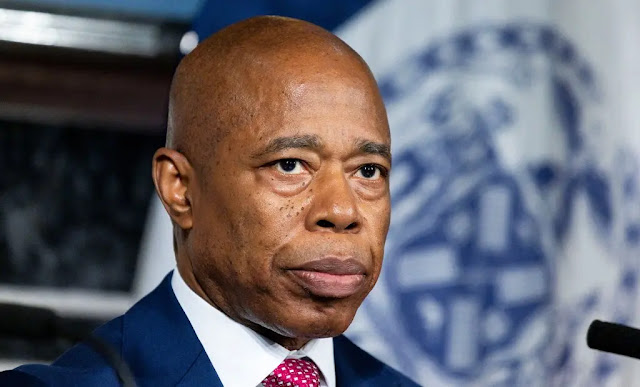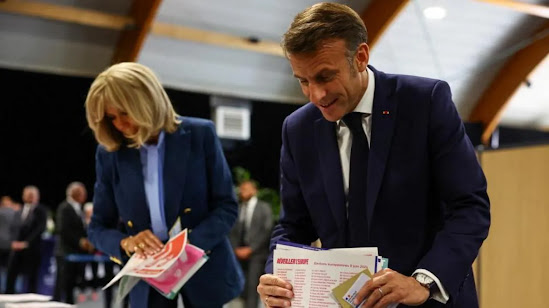Biden and Macron stress a shared vision on Ukraine and Gaza even amid bubbling disagreements.
**PARIS — Presidents Joe Biden and Emmanuel Macron showcased their united front on the conflicts in Ukraine and Israel during their discussions on Saturday, despite ongoing tensions within the international approach to these crises.**
Macron began by expressing gratitude for the critical support the U.S. has provided to Ukraine in its resistance against Russian aggression. He also backed Biden’s peace initiative for the Gaza conflict. Biden, in turn, emphasized the strong ties between the U.S. and France and welcomed the release of four Israeli hostages earlier that day. He praised the recently approved $61 billion defense aid package for Ukraine and reiterated the U.S.’s steadfast commitment to Ukraine's defense.
“Putin won’t stop at Ukraine,” Biden declared. “All of Europe could be at risk. The United States won’t let that happen...we’re in this to the end.”
These public remarks followed a private meeting between Biden and Macron and capped two days of predominantly ceremonial engagements for Biden in Paris.
“This week, we have once again demonstrated the power of alliances and what can be achieved through unity,” Biden announced.
However, their display of solidarity and the brevity of their public statements, which avoided delving into the specifics of their discussions, concealed deeper differences between the allies. These discrepancies have gained urgency with upcoming G7 and NATO summits.
National Security Adviser Jake Sullivan had earlier indicated that the talks would be “sensitive” and “intense.” Yet, aside from an agreement to enhance maritime law enforcement in the Indo-Pacific, few concrete outcomes were presented from their discussions, as previewed by National Security Council spokesperson John Kirby.
A significant topic of discussion was the ongoing support for Ukraine as the war against Russia enters its third year. Both Biden and Macron had meetings with Ukrainian President Volodymyr Zelenskyy on Friday, demonstrating their continuous backing.
“The U.S. stands with you,” Biden told Zelenskyy at the start of their 30-minute meeting. He highlighted Ukraine’s crucial role in resisting aggression and described the West’s support as a fundamental duty, despite the delay in delivering a $60 billion defense aid package.
“We are fully committed,” Biden assured.
However, some of Zelenskyy’s aides are reportedly frustrated with what they perceive as Biden’s cautious stance on a conflict he sees as critical to NATO’s and global democracy’s survival. Macron has proposed sending troops to train Ukrainian forces and has not ruled out the possibility of more direct military involvement.
Macron had intended to announce the deployment of several hundred French troops to train Ukrainian units during this week’s D-Day commemorations. This plan, however, has been delayed due to Russian threats and the complexities of EU politics during election week. Nonetheless, Macron remains in talks to lead a coalition of countries in training Ukrainian forces. He mentioned in a Friday press conference with Zelenskyy that several NATO countries had already joined this initiative, which he expects to finalize soon.
Biden, on the other hand, is trying to persuade Macron to support a plan to use $300 billion in seized Russian assets to provide further aid to Ukraine. France is currently the only G7 nation resisting the U.S. proposal to offer Ukraine a $50 billion loan, repayable from these seized funds. Last week, Biden discussed the feasibility of this plan with Belgian Prime Minister Alexander De Croo, since most of the assets are held in Brussels. The EU has tentatively approved the concept, and there is optimism that Macron will come on board before the G7 summit in southern Italy next week.
The leaders did not address questions about this disagreement, leaving the stage together after their 18-minute press briefing.
Economic tensions were also on the agenda. Facing potential political setbacks in Sunday’s EU elections, Macron is pressing for changes to U.S. trade policies, which he argues have stifled European growth. Europe has borne the economic brunt of the war in Ukraine by halting Russian energy imports and imposing sanctions on the Kremlin. Macron has criticized U.S. manufacturing subsidies, which he believes could harm European businesses by diverting investment.
While experts do not anticipate any immediate adjustments to benefit European producers during Biden’s term, Macron hopes ongoing discussions will eventually lead to favorable outcomes. He recently met with Chinese President Xi Jinping to address trade disputes that could increase China’s influence in Europe. Biden is seeking to convince France and the EU to join the U.S. in countering China’s economic power by raising tariffs on Chinese goods.
Macron remains cautious about allowing Washington to dictate Europe’s approach to China, cautioning last year against blindly following the U.S. into a trade conflict, especially given Europe’s current economic and geopolitical challenges.
Despite these differences, Biden and Macron aimed to present a united front in their public statements following their meetings, before shifting to more ceremonial aspects of the state visit.
Biden’s acceptance of Macron’s invitation for a state visit—the only one he has accepted in this election year—signals the value he places on the U.S.-French relationship and his personal rapport with Macron.
Even the format of their press interaction was a point of negotiation, with the White House resisting Macron’s request for a longer, more open-ended press conference. This decision, reflecting the delicate nature of their discussions, was acknowledged by Kirby as the agreed arrangement.





Commentaires
Enregistrer un commentaire